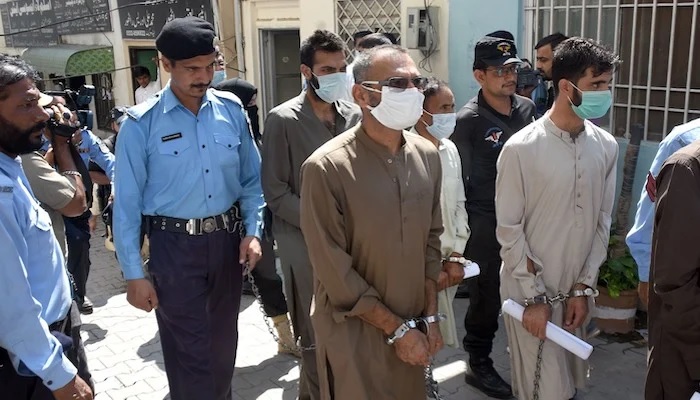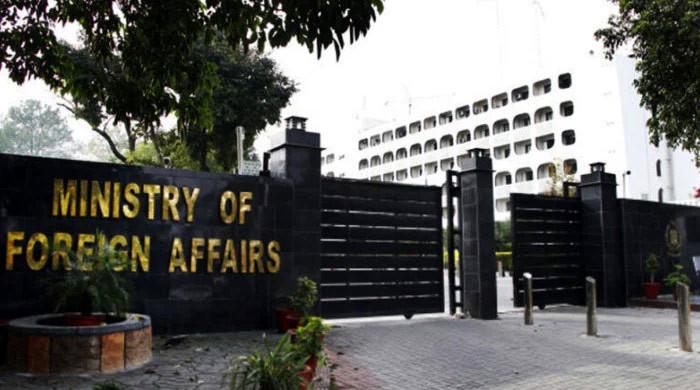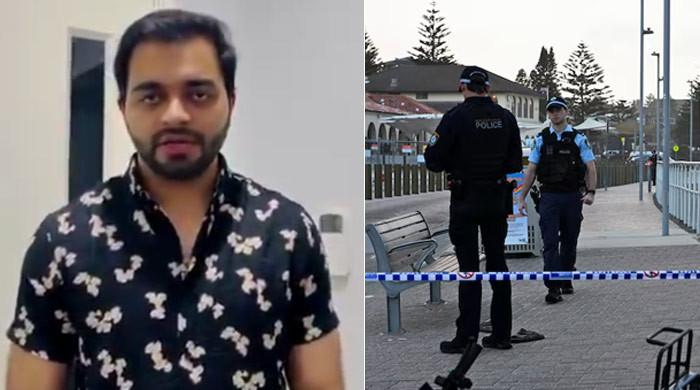Noor Mukadam murder case: SC orders prosecution to give evidence against Zahir's mother at next hearing
Zakir Jaffer, Ismat Adamjee had approached apex court after being denied bail by Islamabad High Court
October 11, 2021

- Supreme Court asks prosecution to present evidence against prime suspect Zahir Jaffer's mother Ismat Adamjee at next hearing.
- Justice Umar Ata Bandial says no mention of Ismat Adamjee in IHC order.
- Hearing adjourned till October 18.
The Supreme Court (SC) ordered the prosecution to present its evidence against Ismat Adamjee, the mother of Zahir Jaffer, the prime suspect in The Noor Mukadam murder case, at the next hearing scheduled for October 18.
The apex court was hearing the bail pleas of the parents of Zakir Jaffer and his wife Ismat Adamjee, which the couple had filed separately in the SC after the Islamabad High Court (IHC) had earlier rejected their bail pleas.
Justice Mansoor Ali Shah asked where mention of Ismat Jaffer had been made in the order by the IHC.
Ismat Jaffer has not even been mentioned by the IHC in its order [denying the couple bail], Justice Umar Ata Bandial said. We are just trying to understand the case, Justice Bandial explained.
Zakir and Ismat's counsel Khawaja Haris argued that the murder case had been registered against Zahir Jaffer and that his parents were in Karachi at the time of the murder.
Justice Qazi Amin later stated that the Noor Mukadam murder case is very sad and extended his sympathies with the family of the victim.
He, too, said that the court was seeking information only to understand the facts of the case.
Justice Bandial said that he found out during the recess that there had been a death in his family and that he immediately had to leave for Lahore.
The apex court then ordered the prosecution to present its evidence against Ismat Zakir at the next hearing.
Haris, however, responded that the forensic reports had not been received yet.
The right to a fair trial is mandatory but delay in disposing a case adds to anxiety, Justice Bandial said, explaining that the purpose of a speedy trial is to give immediate relief to the innocent people named in the case.
All forensic reports have been received except for the reports on six mobile phones, the advocate-general said.
The hearing was adjourned till October 18.
The murder
Noor Mukadam, a 27-year-old woman, was raped and murdered with a sharp instrument on July 20 within the limits of the Kohsar police station in Islamabad. A case of murder was later registered at the same police station by Noor's father, former Pakistani ambassador Shaukat Ali Mukadam.
Zahir Jaffer is the prime suspect in Noor Mukadam's murder case. The grisly murder, in which Mukadam was beheaded, took place on July 20 in Islamabad's F-7 area.
The Islamabad police arrested suspect Zahir Jaffer on the night of July 20 from his house where, according to Noor's parents, he killed her with a sharp instrument and severed her head.
The gruesome incident sparked a nationwide campaign seeking justice for her, with #JusticeforNoor becoming a top trend on Twitter.
Islamabad court rejects bail pleas of Zahir Jaffer's parents
Earlier, the IHC had rejected the bail pleas of Zakir Jaffer and Ismat Adamjee in the Noor Mukadam murder case.
The IHC also ordered the trial court to complete the trial within eight weeks. IHC's Justice Aamer Farooq initially delivered a brief verdict. A detailed verdict was released later.
Zakir and Ismat had filed bail petitions in the Noor Mukadam murder case stating that they had nothing to do with Noor's murder, while the police challan presented in court said that if Zahir's parents had informed the police in time, Noor could have been saved.
What did the Islamabad High Court's detailed verdict say?
In its detailed verdict, the IHC ruled that Zahir Jaffer's parents committed the crime of aiding and abetting Noor's murder.
The court said that Zahir's parents knew their son had taken Noor hostage and despite having this information, they did not share it with the police. The watchman had clearly stated that he had informed Zakir Jaffer, the court added.
The detailed judgment also refers to the decisions of the SC.
The SC has said that aiding and abetting murder is as serious a crime as murder, the IHC said, adding that aiding and abetting a crime can also be direct, for which there is sufficient factual evidence.
According to the Black's Law Dictionary, not doing one's duty is also aiding and abetting, the IHC verdict said.
Zahir Jaffer, the court said, had said in his confessional statement that he had informed his father about Noor. Whether Zahir's statement is acceptable or not is to be decided by the trial court, the IHC said.
Zahir's parents challenge IHC bail rejection in SC
The parents of Zahir Jaffer then approached the SC for bail.
The petition, filed in the apex court by Advocate Khawaja Harris on behalf of Zahir's parents Zakir Jaffer and Ismat Adamjee, asks whether not reporting the "incident" counts as aiding the crime.
The text of the petition stated that the Islamabad High Court (IHC) wrongly reviewed Section 107 of the Pakistan Penal Code.
The petition further stated that there is no evidence to suggest that Zahir's parents knew the intentions of their son and that their bail application cannot be dismissed on the basis of the statement of a co-accused.
The petition said that a complete challan of the case has not yet been presented in the trial court, while the high court went beyond its jurisdiction by directing to complete the trial in two months.
The petition filed in the SC further said that delivering a verdict in two months goes against the rights of the suspects and the principles of a transparent trial.
The police investigation in the Noor Mukadam murder case was one-sided and not impartial, the petition stated further. The defendants will not be able to defend themselves properly in prison, it argued, adding that it is very difficult for them to communicate with their lawyers in prison.









